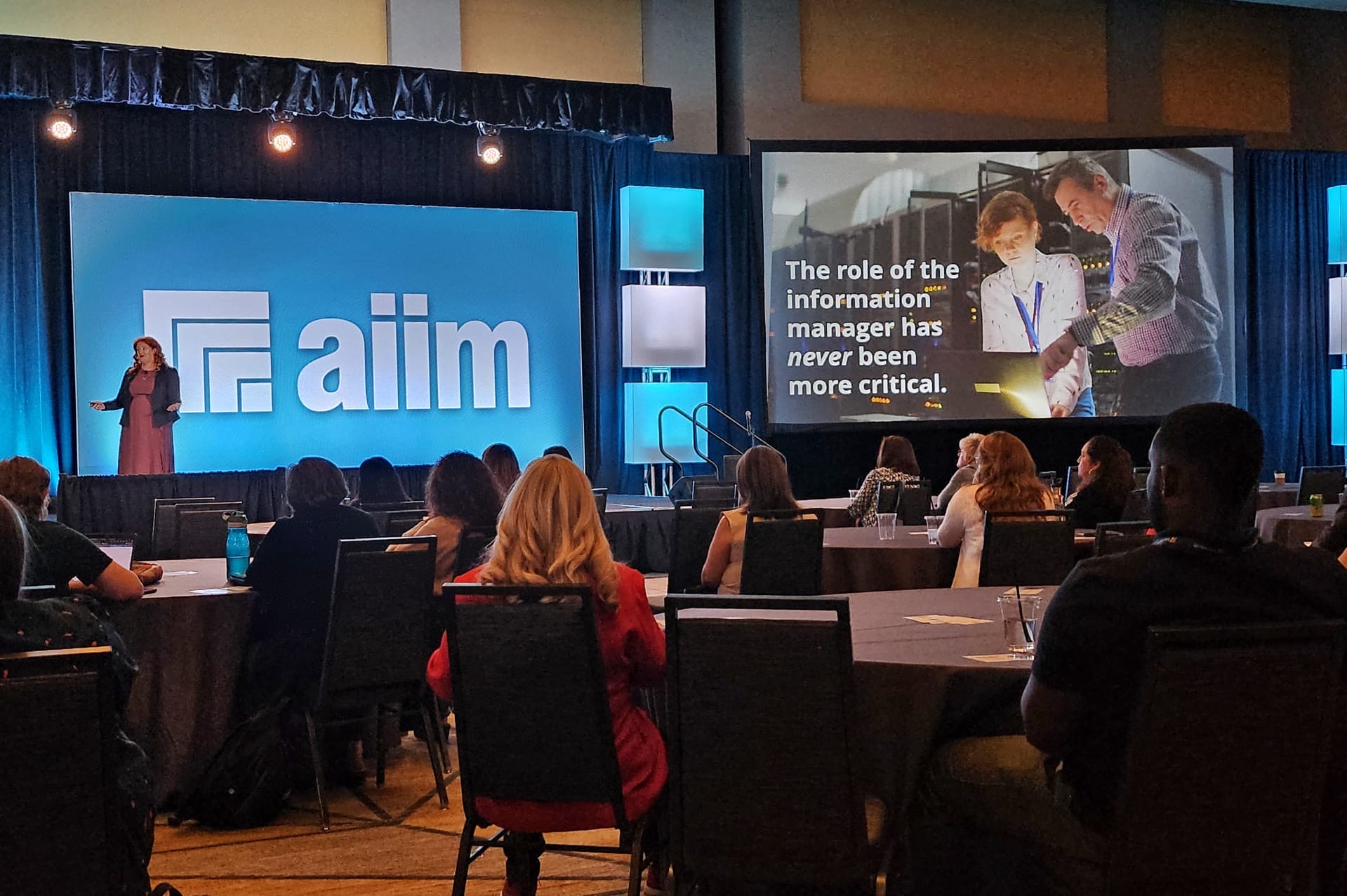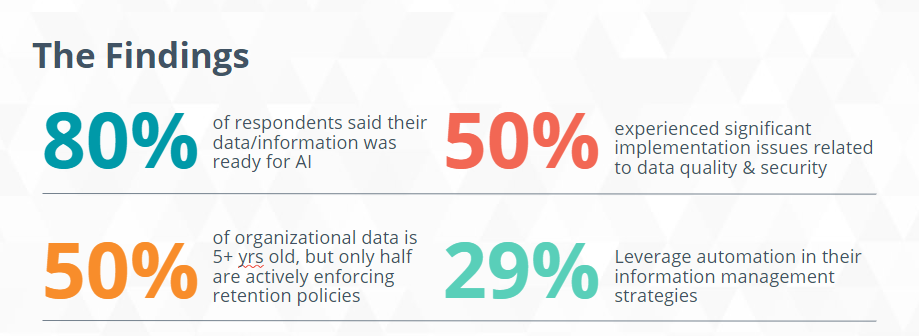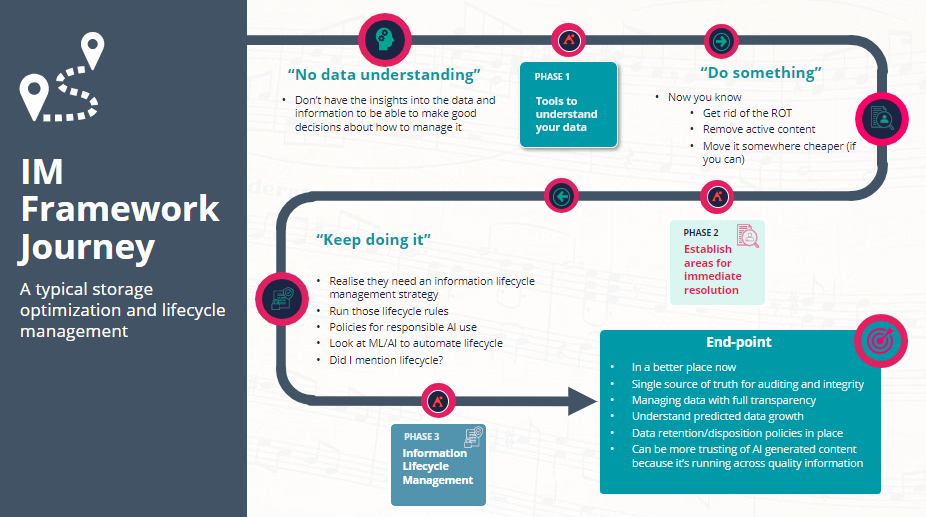The Association for Intelligent Information Management (AIIM) Conference was back again for another year! The AIIM Conference 2024, held on April 3-5 in San Antonio, Texas, brought together information leaders from across industries and countries to explore the transformative impact of AI and the flow-on effect for information management.
As the “Guardians of the Future,” information managers have been essential to unlocking the strategic value of data and information and more than ever in this new era.
AvePoint was a proud participant in the conference, with Alyssa Blackburn, AvePoint’s director of records and information management and AIIM board of directors, delivering a keynote session. In her keynote, Alyssa addressed concerns about the relationship between AI and information management (IM), and highlighted the critical role of information managers in filling these gaps.

If you weren’t able to be there, this blog post will recap the key highlights from Alyssa’s insightful presentation. It will explore how information managers can position their organizations for success in the era of AI and exponential data growth.
What’s Happening Out There?
Ever the storyteller, Alyssa kicked off the keynote with a story that could only happen to her (or members of her family in this case). It’s about a horn that wouldn’t stop, that screeched loudly over a neighborhood, disturbing all of those who came into any kind of contact with it.
What does a horn that just won’t be quiet have to do with the ever-growing AI challenge? AI arrived just like the horn, loudly and disturbing all those around it. People around were confused at first and then upset. They didn’t know what to do, and the person driving the car didn’t have any control over the horn, even though they knew it was causing problems for everyone. An expert was required to address the horn, make it useful and fit for purpose — and the people it disturbed needed reassurance and support.
AvePoint was also very proud to be able to release the “AI and Information Management Report” at the AIIM conference. This report provides a sobering look at the readiness for AI organizations to believe they have versus the reality most experience when implementing these new tools.
The report tells us that AI adoption continues to surge – 80% of organizations plan to increase AI spending in 2024 – signaling significant changes in how we work. Organizations are eager to leverage the power of AI, but while many felt their data and information were ready for AI, the reality was simply not the case. It is hard to feel ready for the pace of AI advancement and feel like we’re all just trying to keep up.
The report further states that while 80% of organizations believe their data is ready for AI, the reality paints a different picture:

These insights reveal that years of neglecting information lifecycle management are finally catching up for many companies. The findings also point to a state of data delusion for many organizations. This is that they think they’re ready for AI adoption, but their current experience says otherwise.
With data left unmanaged and nearly half of businesses still lacking information management fundamentals, like archiving strategies, retention policies, and lifecycle solutions, organizations face a breeding ground for inefficiencies, errors, and risks.
The Role of Information Managers
While there certainly are risks, there is also great excitement about the possibilities AI can unlock. Leaders are now recognizing that AI can only be as effective as the information and data an organization has at its disposal.
Effective IM is the foundation for successful AI implementation, and information managers are at the forefront of this transformative change.

So, where do organizations need to start to ensure their data and information are as ready as they can be for the AI revolution?
Information Managers need to consider the key pillars of an effective IM framework to help organizations unlock the key to AI success:
- Understand your data: Get a firm grasp of the organization’s data state to make good decisions about managing it.
- Eliminate ROT or inactive content: Once a deep understanding of the data is achieved, remove redundant, obsolete, and trivial (ROT) content and move the rest to more cost-effective storage.
- Implement ongoing information lifecycle strategies: Once you’re confident that your information is up-to-date, accurate, and secure, you need to implement ongoing information lifecycle policies to ensure it can stay that way. There is no point in having policies for retention, disposal, or archival and then not doing anything with them! These lifecycle policies need to be enforced across your environment to ensure your information stays up-to-date and relevant, to be used to the best advantage with AI tools.
Once a robust information lifecycle is implemented, organizations can achieve a single source of truth for auditing and data integrity purposes while managing data with complete transparency. This can further help accurately predict data growth and build trust in AI-generated content by ensuring it operates on quality information.
Information Managers: The Guardians of the Future
The AIIM Conference 2024 underscored the vital role information managers play in guiding organizations through the AI revolution. By embracing the IM Journey framework and taking a proactive approach to information management, our “Guardians of the Future” can position their companies for success in the AI-driven world.
Want to learn more about the current state of AI and information management? Download the AI and Information Management report.


